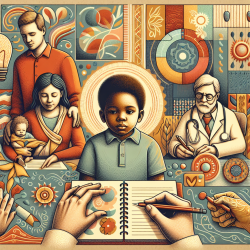Introduction
Child marriage is a persistent issue in many parts of the world, especially in developing countries like Bangladesh. Despite legal frameworks designed to prevent this practice, child marriage remains prevalent due to deeply entrenched social norms and economic pressures. The research article "Harmful practices prevail despite legal knowledge: a mixed-method study on the paradox of child marriage in Bangladesh" provides valuable insights that can help practitioners, educators, and policymakers address this complex issue more effectively.
Understanding the Research
The study conducted by Akter et al. explores the paradox of child marriage in Bangladesh, where legal knowledge exists, yet the practice continues unabated. It highlights the significant role of social norms and economic factors, such as poverty and dowry, in perpetuating child marriage. The study involved interviews with adolescents and their parents across three districts in Bangladesh, revealing that while there is awareness of the legal age of marriage, societal pressures often override legal considerations.
Key Findings
- Legal Awareness: Most respondents were aware of the legal age for marriage and the penalties for child marriage, yet social sanctions and economic incentives often led to its continuation.
- Social Norms: The practice is deeply rooted in cultural norms, where early marriage is seen as a way to protect family honor and reduce financial burdens.
- Economic Factors: Poverty and the practice of dowry are significant drivers, with families often marrying off daughters early to alleviate financial pressures.
- Sexual Harassment: Fear of sexual harassment and societal criticism also contribute to the decision to marry off girls at a young age.
Implications for Practitioners
For practitioners working in education and social services, this research underscores the importance of addressing both legal and social dimensions of child marriage. Here are some strategies that can be implemented:
- Community Engagement: Engage community leaders and influencers to challenge and change harmful social norms.
- Education and Awareness: Implement educational programs that emphasize the negative impacts of child marriage and promote gender equality.
- Economic Support: Provide economic incentives and support to families to reduce the financial pressures that lead to child marriage.
- Legal Enforcement: Strengthen the enforcement of existing laws and ensure that legal frameworks are supported by community initiatives.
Encouraging Further Research
While the study provides valuable insights, it also highlights the need for further research to explore the effectiveness of interventions and the role of media in changing perceptions. Practitioners are encouraged to collaborate with researchers to develop and test new strategies that can effectively combat child marriage.
To read the original research paper, please follow this link: Harmful practices prevail despite legal knowledge: a mixed-method study on the paradox of child marriage in Bangladesh.










